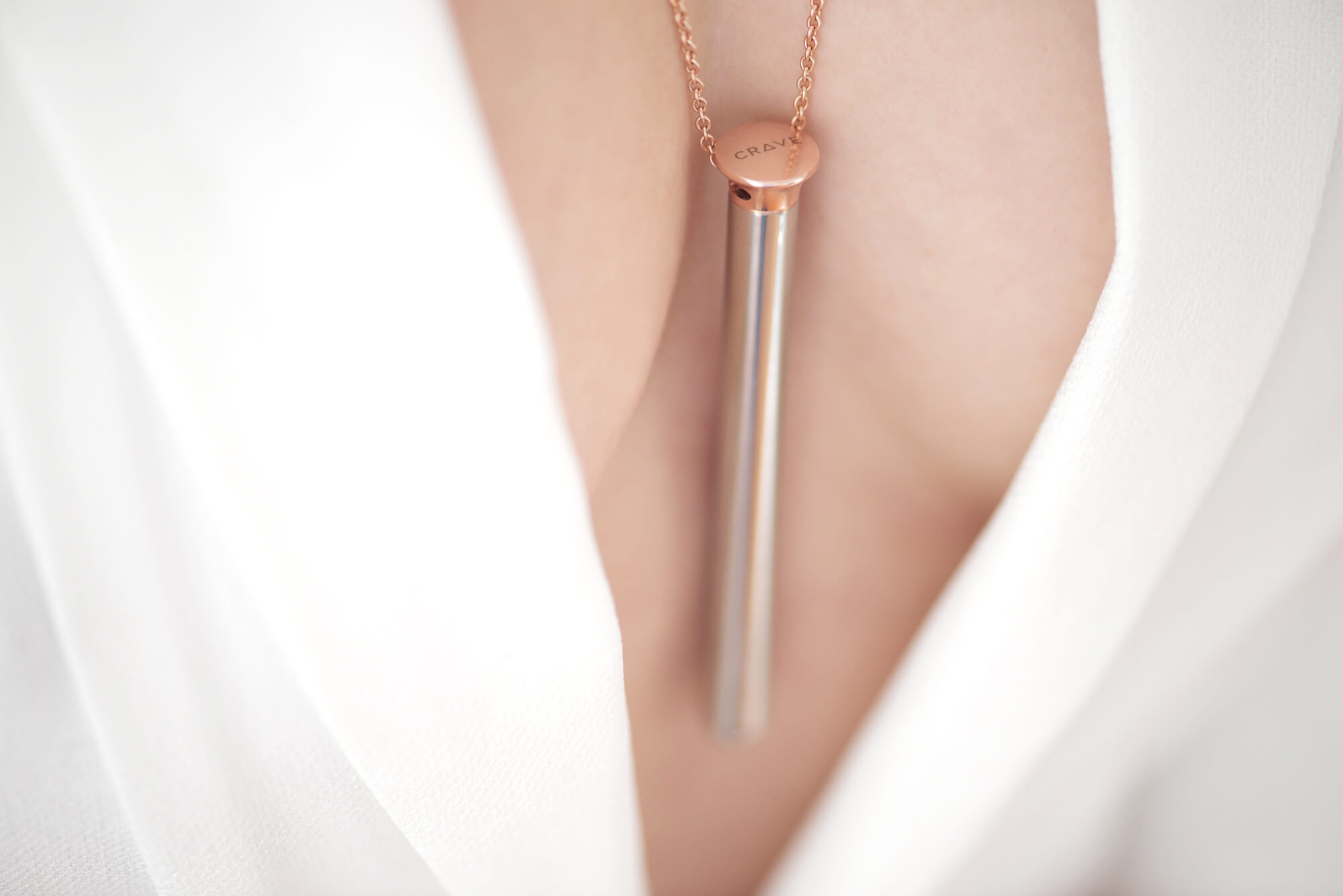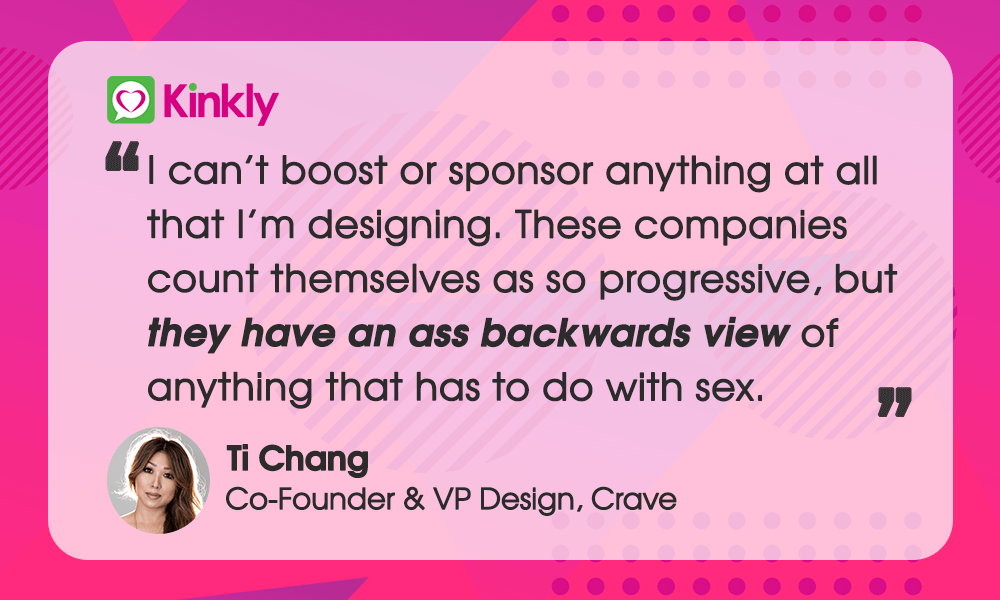This article is part of a series around femtech and the people leading the charge in this growing sector. See the femtech series here.
Venture capital funding: Check. Profitability: Check. Distribution in mainstream retailers: Check.
Ti Chang, co-founder and VP of Design at Crave, has checked so many of the boxes startups aim for - and she did it as the head of a company that sells vibrators.
And not just any vibrators. Beautiful vibrators. The company’s best known for the Vesper, a powerful vibrator designed to be worn as jewelry. It’s a bold piece of bling, but it's also a statement. Pleasure, it says, is something that can be worn with pride.
 The Crave Vesper, a wearable vibrator
The Crave Vesper, a wearable vibrator
Source: Crave
For Chang, focusing on delivering products that center women's needs has been a lifelong pursuit. As an industrial designer, she says she’s only ever worked on products for women since she graduated from college.
“As a female industrial designer, I realized I was so rare in the industry,” Chang said. “Industrial design is a really big label that includes a lot of things … there weren’t a lot of women at the table making those decisions around design, so that’s always been my focus.”
It wasn’t long before that focus turned to sexual health and now that she’s been in the business for more than 12 years, she says she sees the adult industry “starting to mature.”
She has a good perspective on how much it’s changed since launching a line of intimate accessories in 2008 under the brand INCOQNITO.
“I bootstrapped this company and sold that to Crave,” Chang said.
In doing so, she joined forces with serial entrepreneur Michael Topolovac, Crave’s co-founder and CEO, who oversees the operations side of the business.
“We recognized that the products available weren’t that thoughtful or well designed and as product engineers we thought we could help solve the problem.”
 Crave co-founder Ti Chang at work
Crave co-founder Ti Chang at work
Source: Crave
They solved another problem too by overcoming one of the key hurdles that plagues many companies in the adult industry: funding. In 2013, Crave closed on $2.4 million in Series A funding; more than 60 investors backed the company. The was followed by $1.3 million in series B funding in 2016.
Of course, Crave is not immune to the discrimination that most companies focused on female health (particularly sexual health) face; Crave can claim the honor of having been kicked off Kickstarter in 2012. To this day, they remain unable to advertise their product on Facebook or Instagram.
“Even on my personal accounts, I can’t boost or sponsor anything at all that I’m designing,” Chang said. “These companies count themselves as so progressive, but they have an ass backwards view of anything that has to do with sex.”

Despite never having “paid a cent” for advertising, Crave has been able to grow and thrive through word of mouth. And while Chang wishes there was no need for the term "femtech", she concedes that the increasing acceptance of femtech and sextech as parts of wellness has benefited the company in recent years; Crave’s products were recently included in Nordstrom’s first push into sexual health products, part of what the company is calling its Intimacy and Sexual Wellness section.
“I think that is a landmark moment for sexual products,” Chang said. “ If you have the right products and the right brand ethos you can be part of the mainstream conversation. We bring into this category the same ethos we would bring into designing cell phones.”
Chang also got to appear on the floor of the Consumer Electronics Show (CES) in 2020 (the event was held virtually in 2021 as a result of Covid-19 restrictions), along with several other SexTech companies, including Dame Lovesense, Ohmibod, Pulse and Mysteryvibe. It was the first year that CES officially sanctioned sex toys following a public outcry in 2019. That's the year the Consumer Technology Association, which operates the conference, stripped an award from sex toy company Lora DiCarlo, suggesting the company’s flagship product was “immoral, obscene, indecent, profane.”
 Ti Chang in the "Build-a-Vibe Workshop"
Ti Chang in the "Build-a-Vibe Workshop"
Source: Crave
“I think in the last couple years the concept of wellness has expanded - we can thank Millennials for that,” Chang said. “It is not about sexual health. The way they view their well-being is so different and it has become way less taboo to talk about it or other things like mental health.”
Of course, 2020 was a year when a lot of things changed, and many of these changes had major repercussions on all kinds of businesses.
“Even outside of what I do, I’m an advocate for design equality, which is about addressing inequality in products designed for women. I felt passionate about this for a long time but it wasn’t OK to talk about until recently,” Chang said. “I think we have also piggybacked on some of the other movements that have happened recently, like Me Too and Black Lives Matter. Now it is actually OK to talk about inequality, which means we can now rally people around the problem.”
So what’s next for Crave?
“We will continue to build products because there is no one perfect vibrator that’ll work for everyone. Pleasure is incredibly complex,” Chang said. “Our products have changed people’s minds about what they thought sex toys could be.”

Crave may also have been a force in changing the business landscape for sex toys, particularly for the wave of female founders entering the market a decade later.
“Now that you can get these things at mainstream places, it tells you that sexual health is part of being a healthy woman,” Chang said. “There are modern companies out there building great products.”
This profile was produced in partnership with The Femmys, the first-ever awards celebrating innovation in femtech. Want to apply for an award? Learn more here. Want to attend the (virtual) event? Get on the list to be the first to know when tickets are released.
Tara Struyk is a co-founder and the editor-in-chief of Kinkly.com. She’s a content creation and management executive with 15 years of experience working in online media. As a writer, her work has appeared in dozens of publications, including Forbes, Glamour, MensHealth and Investopedia.
Tara is currently the VP of Content at Janalta.com, where she leads the editorial department and directs content production for a diverse portfolio of websites in niche verticals. She has launched several sites from the ground up, and has experience managing sites from pre-launch all the way to maturity. She has deep experience in online analytics, SEO optimization, content marketing and editorial direction.
Tara graduated with degrees in English and Journalism from West Virginia University in 2005. She began her career as an editor at Investopedia and worked for several years in the financial media space. She co-founded Kinkly in 2012.
Tara is also an accomplished distance runner, devoted rock climber and obsessive reader.




